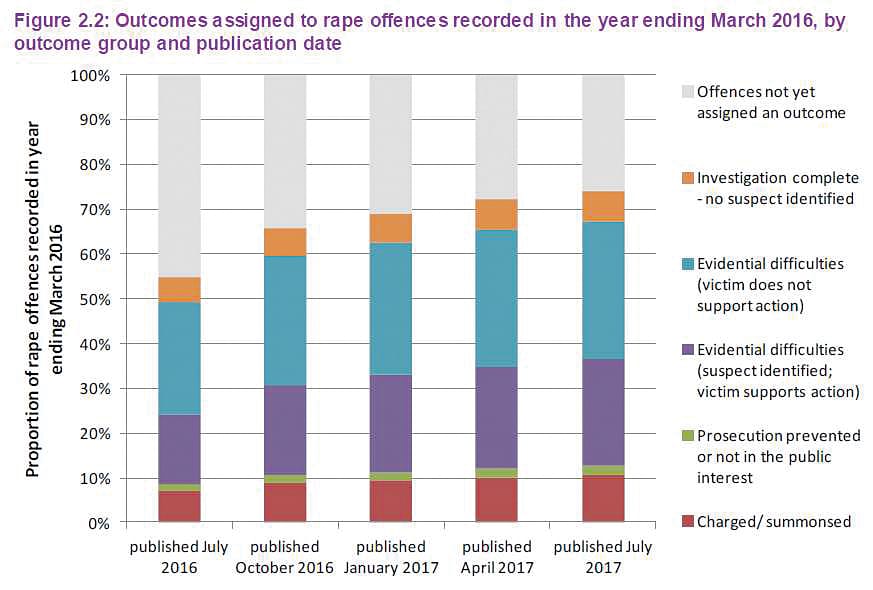Rape law, rape culture, and what Imperial can do about it
An anonymous writer gives their thoughts on how Imperial should tackle sexual harrasment on campus.

Did you know that the police estimated that upwards of 95,000 rapes take place each year in England and Wales? And yet the Crown Prosecution Service (CPS) only managed to convict a rapist in 2991 cases in 2016/17 – that’s only 3%. The police estimated that upwards of 517,000 sexual offences occur each year in England and Wales and yet the CPS only managed to convict a perpetrator in 10,721 cases in 2016/17 – that’s only 2%.
Recent events have brought the issue of rape and sexual assault into the public spotlight, and with dismay have we seen public figures exposed for their abuse of power. Rightfully so we should be outraged at them and their actions; but we cannot solely be outraged at the perpetrators, we must acknowledge the role the criminal justice system (CJS) has played in allowing the perpetrators to go unchecked. We must not blame victims for not coming forward – victim-blaming is toxic and damaging. Instead we must hold our CJS accountable for having had policies in place that did not allow for a fair trial, and left victims feeling silenced. And let us never forget what researchers found when analysing the institutional culture at Imperial: “Despite Imperial’s ‘no tolerance’ stance on harassment and bullying, women in particular reported being silenced in various ways.”
An often-cited reason for perpetrators evading conviction is that victims need to speak up more and go to the police. Let’s explore this statement by trying to understand what happens when victims do go to the police. From Oct 2016 to Sep 2017 the police recorded 48,773 rape offences, an increase of 29% on last year. The police then assigned an “outcome” to each reported case. Rape case outcomes in the year ending March 2016, as of July 2017 (1 year and 3 months later) included:
• ~25% of cases had still not been assigned an outcome, i.e. after 1 year and 3 months the police had still not decided what to do. • ~35% of cases faced evidential difficulties where the victim did not support action – what are the police doing to make 35% of victims that went to the police for justice later withdraw support? • Only ~10% resulted in a suspect being charged or summonsed. This needs to be seen in context of the police identifying a suspect in at least 96% of rape cases
Cases with a charged or summonsed suspect will be brought to court by the CPS. With a long investigation period, only a small fraction of reported cases resulting in a suspect being charged, and the fact that fake rape accusations almost never happen one would expect that once in court, cases would be resolved quickly and almost always end in a conviction. But no, of the 5190 cases of rape the CPS completed in 2016-17, the prosecution was unsuccessful a shocking 42.4% of the time, only managing a conviction in 2991 of the cases. In addition “the median number of days for rape offences to be assigned an outcome was 144 days”; the median time taken from charge to completion for rape cases was 259 days, and has increased every year since 2010. 259 days + 144 days = 403 days. And that’s just the median; being unlucky can mean waiting much, much longer. Requiring anyone going through a rape trial to wait such a long time is just not fair.
48,773 cases of rape reported are to the police, and only 2,991 convictions by the CPS in 2016/17. And then there’s the issue of secondary victimisation, yet another aspect making interacting with the judicial system even more painful. Hopefully this will show that encouraging more victims to come forward is not enough. We need lasting policy change to make the CJS perform much better than it is now.
“I don’t think it’s reasonable for Imperial to not take serious measures to prevent these crimes”
Note that due to the aggregate publishing of data, tracking of individual cases is impossible, thus the number of reported cases in 2016/17 will not be directly comparable with the number of convictions in 2016/17, as cases take a long time to complete. “Total reported cases in 2016/17” refers to when the incident is reported, not when the incident took place (i.e. it includes non-recent cases). It would therefore be misleading to think that 48773/95000=51% of incidents last year were reported to the police. For consistency I simply presented the most recent data.
It is important to remember in this discussion that while the system can still get better, it has most definitely been improving a lot over the last ten years. In 2016-17, as compared to 2007-08, prosecutions for Violence Against Women and Girls have increased by 48.8%, with a corresponding 62.7% increase in convictions (from 51,974 convictions to 84,565); convictions for sexual offences including rape and child sexual abuse is up 71.5% over the same period. The CPS has published the report “Rape Action Plan” to outline tangible changes being made to make court cases fairer, including this reassuring message: “shifting the focus away from the credibility of the victim to the credibility of the overall allegation. This will also involve consideration of the behaviour of the defendant including around seeking consent”.
I think Imperial should incorporate this thinking when dealing with sexual harassment and assault. Improvements in police reporting standards, and high-profile cases like Operation Yewtree and #metoo, have encouraged more victims to come forward; but this is putting the system under pressure, causing case completion times to increase and conviction rates to decrease. If the police and CPS need more resources I hope #metoo can be an occasion for the public to realise that maybe we should give that to them.
But the CJS still isn’t perfect, and that’s where Imperial comes into the picture: for women, being a full-time student in the UK is associated with a 6.8% increased risk of victimisation. I think both Imperial College Union and the College need to play a role in making Imperial safer.
Two years ago, Emily-Jane Cramphorn, our former Deputy President (Welfare), posted an article called “Blurred lines?” in which she argues: “A lack of education and discussion about sex and consent sits at the core of rape culture and until we address this nothing will change.” I agree that open discussion is crucial, but I think there is a flaw in thinking like this about rape culture: It allows perpetrators to argue that they “weren’t educated on the fact that it’s wrong to physically attack others”, and it leads to these traumatising attacks being treated as misunderstandings. An attack is never a misunderstanding. Ignorance of the law should never be an excuse. According to Lundy Bancroft, consultant on domestic abuse, author, and winner of the 2004 Pro Humanitate Literary Award:
“An abuser almost never does anything that he himself considers morally unacceptable… an abuser’s core problem is that he has a distorted sense of right and wrong”
Any abuser found guilty by Imperial obviously needs to realise that what they did was wrong, but since Imperial is not a prison, I do not believe Imperial should ever act as a correctional institution e.g. by issuing consent training. Expulsion is both fairer and safer.

Don’t get me wrong: I understand the utopian dream as presented by Cramphorn that education will prevent a person from doing wrong things in the first place but preventing a person’s first offence is an incredibly complicated issue. Given the scale of the issue, and the outrageous prevalence of repeat offenders, let’s start with what would also have a great impact, but would be much easier: preventing subsequent attacks from the same person.
Roughly one in four (26%) of students at UK universities have suffered unwelcome sexual advances, defined as inappropriate touching and groping. Imperial has roughly 17000 students, so one would expect roughly 4420 Imperial students to have experienced such an incident. A freedom of information request revealed that the number of sexual harassment/sexual assault/rape complaints dealt with by the College between 2010–2017, in total was 11. This would lead us to believe that roughly 0.25% of sexual harassment/assault cases are reported to Imperial. Clearly there’s room for improvement.
Law and policy change at a societal level is difficult and cumbersome but given the current state of how the judicial system handles sexual misconduct, I don’t think it’s defensible for Imperial to not take serious measures to curb these crimes from happening on their grounds by their students. A frequently cited reason for not reporting such a crime to the police is that they “didn’t think the police could do much to help”. I think Imperial should implement a system so good at dealing with sexual harassment and assault that any Imperial student who doesn’t believe in the police’s ability to help them will go to the College instead. A system so good that no Imperial student will ever think of such a crime as being “too trivial to report”: a barrier identified in the recent sexual assault and consent survey at Imperial. I hope Imperial will consider the following:
• Implement an anonymous reporting system equivalent to the one already available for Imperial staff. Students don’t want to be harassed, discriminated or bullied either. • Disallow the Union from handling cases involving sexual misconduct since only the College can expel students. This would prevent serious cases from ever being passed back and forth between the Union and the College, thus curbing distress. Currently, under 17% of the Imperial Student Disciplinary Procedure from 2017, the Union is “expected” to let the College deal with serious incidents on Union grounds, but I think these cases should be handed over by default, not by expectation. • Accountability: Tangible and public promises. I think Imperial should issue a promise of how quickly they will resolve cases. This could be of the form “confirmation receipt of your complaint within 24hr” and “completion of X type of case within Y months.” This will give victims an idea of what to expect from the College and give the entirety of the student body tangible metrics to hold the College procedural system accountable to.








